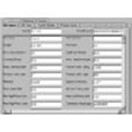Instrumentation
PRODUCTS
-
Rapid deploy Accutech wireless instrumentation solutions from Schneider Electric. Battery-powered wireless sensor networks are used wherever challenging telemetry applications are found. Offering a wide range of available instruments for temperature, pressure, flow, level, and more, Accutech is suited to many industrial applications, specifically including upstream oil and gas.
-
The Equipment Book is a solution for calibration maintenance and instrumentation tracking
WHITE PAPERS AND CASE STUDIES
-
Applying Wireless Instrumentation To Optimize Oil And Gas Wells
The natural gas and oil industry is continually driven by cost-cutting measures and the need to gain more operational efficiencies and visibility to regulatory requirements. Wireless instrumentation systems provide highly accurate digital readings to the control system to assist in making control decisions at the well site. This paper summarizes a solution in which wireless instruments integrate with other conventional equipment to offer a rapidly deployable advanced well optimization system.
-
A Guide To Level Instrumentation For Gasoline Refineries
The safety and efficiency of every aspect of the petroleum refining process is dependent on accurate level measurement. Reliable instrumentation is especially important in the extreme temperature and pressure environments that are often a part of the process.
-
Instrumentation For Produced Water Applications
Produced water refers to any water brought up to the surface during oil and gas production, typically as the result of drilling, exploration and hydraulic fracturing.
NEWS
-
KROHNE To Highlight Process Instrumentation At Canadian School Of Hydrocarbon Measurement 20183/14/2018
KROHNE, Inc. will be showcasing reliable process instrumentation for the oil and gas industry at the Canadian School of Hydrocarbon Measurement (CsHm), to be held March 20-21, 2018 at the Calgary Telus Convention Centre, in Calgary, Alberta.
-
ISA's 62nd International Instrumentation Symposium Issues Call For Papers10/8/2015
The Program Committee of the 62nd International Instrumentation Symposium (IIS) has issued a Call for Papers, inviting authors, innovators, thought leaders and other professionals in the instrumentation field to submit abstracts for presentation consideration at the conference.
-
Market Forecast To Add $2.5B To Market Size For Process Instrumentation7/31/2014
The 2014 Market Forecast published in May by the Measurement, Control & Automation Association (MCAA) provides a five year market forecast for Process Instrumentation & Automation (PI&A) equipment segmented by major process industries that shows the total US market value will grow to $13.6B ($1.3B in Canada) by 2018.
-
Ayalytical Instruments Adds Rikagu Micro-Z, An Ultra-low Sulfur Analyzer, To Petroleum Instrumentation Product Line8/22/2013
Ayalytical Instruments announces the Rikagu Micro-Z ultra-low sulfur (ULS) benchtop analyzer for the petroleum industry, as an exclusive addition to its product line of instrumentation to the petroleum, biofuels, lubricants and materials testing industries.
-
Lightning Expertise Helps Boost Protection Of Instrumentation For One Of Earth's Biggest Attractions — Fuel Pipelines9/2/2010Abriox has upgraded the lightning protection on its remote corrosion monitoring solutions for pipelines, with the help of the lightning test consultancy services of Cobham Technical Services
INSTRUMENTATION ABOUT DOCUMENT
Instrumentation
The science of measuring and controlling variables is termed instrumentation. As the name suggests, the process involves using a wide variety of instruments. These are classified as any device that can measure amounts that are physically quantifiable. These instruments do not have to be extremely complex in design. For example, the ruler is an instrument to measure distance, and a simple thermometer measures temperature.
Instruments specific to petrochemical processing include platinum Resistance Temperature Detectors (RTD’s), P/I Converters, many types of level meters, chromatographs, and continuous gas analyzers. These instruments are essential to the day to day instrumentation at petrochemical plants, as it is impossible to gauge to the necessary extent by estimation alone. Human error is inevitable, but an instrument can easily be calibrated or replaced.
Now that you understand the definition of and tools used in instrumentation, you should also understand the necessity of it. Temperature and pressure meters serve to ensure that the environment stays safe for both the chemicals being processed and the employees of the plant. Heat is a very well-documented activator in chemical reactions. If the temperature rises to unusual levels, this could spark an undesired chemical reaction that could prove catastrophic. The flow meter must measure how much oil is leaving the refinery, as it is a very volatile substance. Analytical instruments, such as the chromatograph, analyze the chemical make-up of the refined oil. This allows for the opportunity to make sure that the chemical make-up is correct, giving evidence that the process was correctly completed at all stages of refinement.

